Inside Kwara’s understaffed, dilapidated primary healthcare facilities
By Uchenna Igwe
Despite huge budgetary allocations and releases by the Kwara state government for the rehabilitation and repair of Primary Health Care Centres (PHCs), facilities in Edu, Moro, Ifelodun and Ilorin West LGAs, are largely understaffed, dilapidated and ill-equipped; unable to cater to citizens’ medical needs.
Ahmed Luma, 64, laid helpless on a mat in front of the dispensary at the primary health centre (PHC) in Bacita, Edu Local Government Area (LGA) waiting to be attended to. Occasionally, he would turn slowly, letting out pitiful, muffled groans with short gasping breaths.
”It started two days ago. When he got back from the farm, he complained of a serious headache and pains all over his body. That night he could not sleep,” Mr. Luma’s daughter, Mariam said.
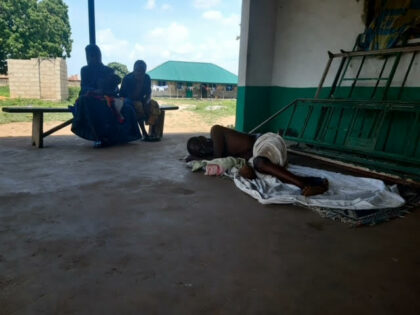

The next morning, Mariam helped get her father to the health centre, where he was diagnosed with malaria.
“After the test, they gave him drugs and asked us to go home and come back the next day for more treatment,” she said, noting that they could not admit her father due to the poor condition of the facility.
“It is even better I took him home than leave him to sleep there and be exposed to the same mosquitoes that caused malaria.”
Luma is one of over 60 million Nigerians infected with the disease every year, especially in rural settlements like Bacita where prevalence is 2.4 times more than in urban areas. The disease is a leading cause of death in Nigeria, accounting for 31 percent of global malaria prevalence -the highest in the world.
Read Also: WASH takes a back seat as Kwara govt embarks on PHCs renovation
Among strategies for the control of malaria and other diseases in Nigeria, is the strengthening of the capacity of Primary Healthcare Centres (PHCs) for intervention and proper case management in rural communities. However, an investigation by SOLACEBASE across Kwara communities, particularly those in Edu, Moro, Ifelodun and Ilorin West LGAs, revealed that PHCs in the state are bedeviled by infrastructural decay, poor staffing, ill-equipped and underfunded, often denying citizens access to quality basic healthcare.
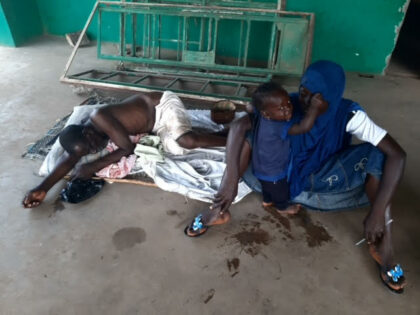
In Bacita, the only public health facility in the area, where Mr. Luma sought treatment, is in a deplorable state. The facility operates from two buildings: a dispensary which caters to the daily health needs of the communities and a maternity centre that offers antenatal, birth delivery, immunization and family planning services.
At the dispensary, there are no doors, windows and no ceilings; only cracked walls, old tables, benches and shelves with books, empty cartons, a number of medicine bottles, as well as two beds with worn-out mattresses. The situation is largely the same at the maternity building, save for the windows and doors which were in good condition.
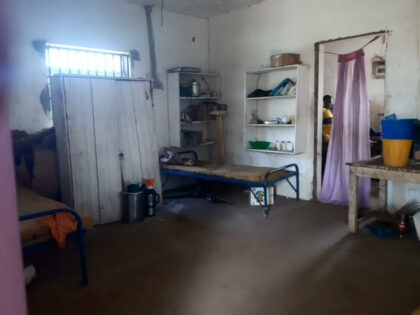
Although the state government had begun renovating the facility, residents say it was halted some months ago. The officer-in-charge of the dispensary, Umar Ndaladi, confirmed it: “Some people from state Primary Healthcare Development Agency came here and started some renovation work. They brought down the ceiling and the doors for replacement, but they stopped working around February.”
The facility also lacks Water, Sanitation and Hygiene (WASH) infrastructure and essential medical equipment. Staff at the PHC rely on water from a nearby well, as the manual pump borehole provided in 2020 by the Kwara State Rural Water Supply and Sanitation Agency (RUWASSA), had long stopped working.
Read Also: PHOTOS: How Kano born Faisal’s innovation locally produced tricycle
In the absence of a functional toilet facility, patients who visit the health centre resort to open defecation, Mariam Jibril, a resident told SOLACEBASE. The state currently tops the open defecation chart, according to the national survey for Water, Sanitation and Hygiene (WASH-NORM).
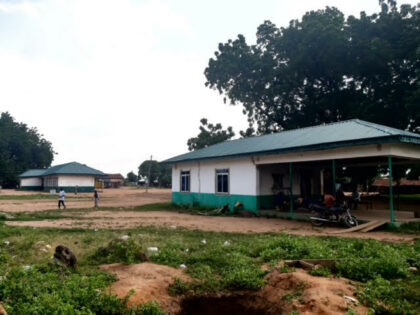
“People normally use the bush to ease themselves because there is no toilet. Maybe when they finish this one,” she said, pointing to a yet to be completed building, “then people can use it.”
Alternatively, residents visit Ogo-Oluwa Hospital, a private health facility in the area, while others who cannot afford the expenses of private care resort to the use of herbal medicines, better known as “cigbe dukun” amongst the town’s predominantly Nupe population.
The tale of dilapidation is not peculiar to Bacita PHC. An assessment of PHCs in Ifelodun, Ilorin West and Moro LGAs reflect the same sad reality.
Built in 1968, the PHC in Idofian, Ifelodun LGA, serves over 10,000 residents across four settlements, including Idofian, Jimba, Alakuko and Falokun. Despite efforts by the community to sustain the facility for years, it was at the brink of collapse but for the intervention of the Basic Health Care Provision Fund (BHCPF) in October 2021.
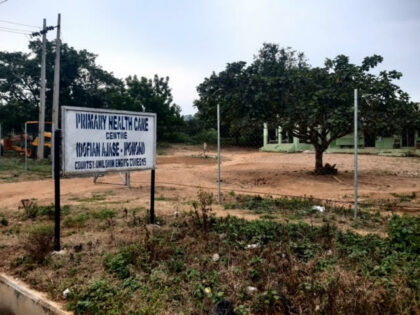
“This place was almost crumbling. But with the BHCPF money, we were able to fix some of the broken walls and change part of the roof and ceiling which had been destroyed by termites, especially at the pharmacy and wound dressing room,” the officer-in-charge of the facility, Olawunmi Afolayan told SOLACEBASE.
She recalled how staff at the PHC struggled to access potable water before a recent repair of the borehole by the community. “Before they repaired the borehole, we used to walk a distance to fetch water with kegs and buckets. Sometimes, we pay a man who bring (jerry cans) water to us with a wheelbarrow,” she said.
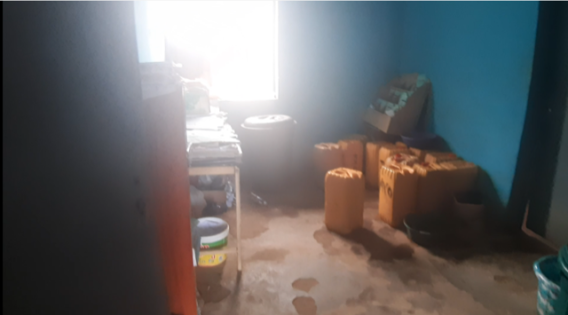
The PHC requires more rehabilitation to get it back in shape. “Hopefully, when the basic health money comes again, we can finish the renovation work, because we still need to fix some parts of the roof, ceilings and the crack on these walls,” Mrs Afolayan added.
Like in Ifelodun, PHCs in Moro LGA share the same predicament. Anyone who passes by the PHC in Bode Saadu, would likely assume that all is well with the facility. But beyond its bright brown walls, the PHC is ridden with multiple problems, prominently, its leaking roofs which usually leaves staff and patients displaced in the event of rainfall.
Read Also:Windstorm damages 1,300 houses, others in Jigawa
“If it rains here, the whole place will be leaking because of the bad roof and that is how we will be running from rain inside the building,” Amode Abdulkareem, a staff at the PHC disclosed to SOLACEBASE. She attributes the situation to the poor execution of renovation works at the facility by the contractor.
“The contractors did not do a good job. Even the doors that they put, you can see that some of them have already fallen off. Many parts of this building are not in good condition.”
The PHC was grossly under-equipped until a recent intervention by the Saliu Mustapha Foundation, which donated amongst other equipment, crank hospital beds, mattresses, infant incubators and an oxygen tank, to the facility.
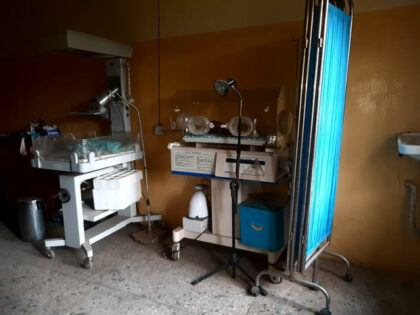
The stench from heaps of refuse littered in the facility premises is another source of worry to staff and patients. SOLACEBASE found out that the community converted a section of the PHC into a dumpsite, where all forms of waste, including faecal matter, are disposed of.
“There is nothing that they don’t drop here, even shit (feaces). Just go round and see for yourself,” a staff obliged this reporter. “We have had issues with them many times but they have refused to stop dumping refuse here.”
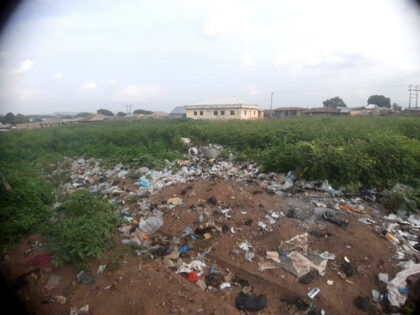
Members of the community argue there are no alternatives for waste disposal in the area. A resident, Jimoh Abdulateef said that they have “been dumping refuse there for a long time. There is no other place we can pour refuse apart from there. If the government finds another place for us to use, we can stop.”
PHC staff quarters taken over by the police
Like PHCs visited in the state, the PHC in Bode Saadu does not operate a 24-hour service – a situation which has been linked to the lack of power supply, shortage of staff, especially the absence of accommodation for staff on night duty.
The National Primary Healthcare Development Agency (NPHCDA) guideline requires that PHCs have staff quarters or accommodation within the community, to aid the provision of service delivery round the clock. While the facility has two staff residences, they are inaccessible to staff of the PHC, as they have been illegally taken over by the Nigeria Police. This includes the initial staff quarter and another constructed under the Sure-P project in 2018, which SOLACEBASE learnt is occupied by the Area Commander, an Assistant Commissioner of Police in charge of Bode Saadu.
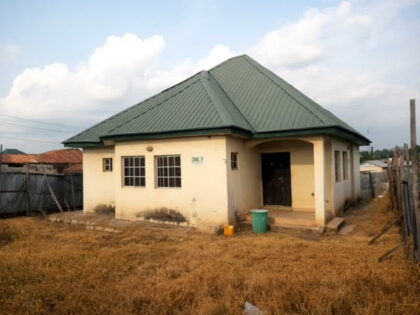
“The building was opened to accommodate some policemen who came for special duty in 2021, but they have refused to leave since then,” a staff at the PHC said. The other one built from Sure-P has been taken over by the police area commander. That is where he sleeps.”

SOLACEBASE reached out to the Kwara state police spokesperson, Okansanmi Ajayi, who promised to “enquire and get back to” this newspaper on the issue. However, Mr Ajayi did not provide any feedback. Further calls to his phone were not responded to.
Tales from Offa Health Centre
Apart from its tiny sign post and wall lettering, which did little to remedy its obscurity, the Offa Garage Health Centre in Ilorin West LGA, could easily pass for a mini poultry house as it has no semblance of a primary health centre (PHC).
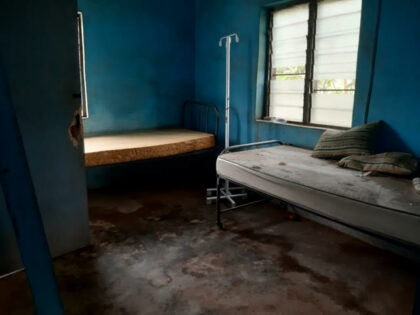
The PHC is in shambles; with broken walls, floors and leaky roofs. It has no water source, no power supply, functional beds and mattresses or other basic medical equipment that should be found in a health facility. For a facility that serves over 11,000 people, there are hardly any drug supplies at the PHC.
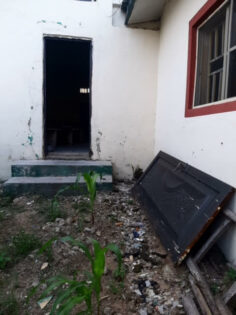
Since its construction by the administration of the former governor, Rear Admiral Mohammed Lawal, the PHC at Offa Garage has seen no renovation. Over the years, it has been largely sustained through financial contributions of its staff, with no intervention from the government.
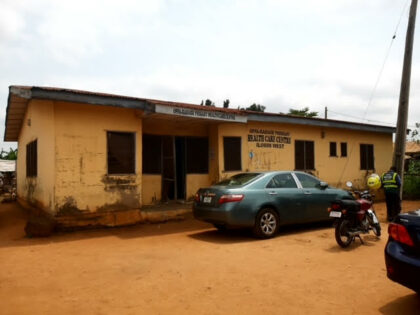
“As you can see, the facility is not in good shape. We don’t have anything here. We raise money by ourselves to keep it running. We are just improvising and this is not even a rural area. Like when this floor was bad, we contributed money to work on it,” a staff who did not want to be mentioned, told SOLACEBASE.
When it rains, staff and patients at the PHC take shelter in a small office – the only part of the facility without a leaky roof. This is despite the huge budgetary allocations by the government for the rehabilitation of health facilities in the state.
A look into Kwara healthcare financing
Between 2017 and 2022, a sum of ₦125.45 billion naira was budgeted by the Kwara state government for the health sector, with ₦3.95 billion representing 3.15% of the budgeted amount within this period, specifically allocated for the rehabilitation/repair of Hospitals and Health Centres across the state.
Specifically, the 2021 Kwara state Accountant General’s report revealed that ₦379,479,968 was disbursed for the rehabilitation and repair of hospitals and health centres in the state in 2020, followed by another ₦385,748,022 in 2021. In 2020, the Kwara state government further released the sum of ₦183, 523,591 for the purchase of medical equipment, and another ₦266,906,586 for the same purpose in 2021.
An analysis of the 2022 budget also showed the failure of the Kwara state government to fulfill its pledge to improve health funding. In 2021, the state governor, Abdulrazaq Abdulrahman hosted his colleagues – fellow governors of the All Progressives Congress (APC), to a summit in Ilorin, where they agreed to allocate at least 15% of the total budget to the health sector, in line with the Abuja declaration.
Despite pledging to commit more resources to healthcare financing, the Kwara state government allocated only N16.74bn out of N189.62bn, translating to 8.83% of the total budget to the health sector in 2022.
“Need for improved health funding” – Experts
There have been calls for increased health financing and accountability of existing expenditure, as a key strategy to improve health service delivery and achieve Universal Health Coverage (UHC) in Nigeria.
Ibrahim Abubakar, a professor of infectious disease epidemiology at the University College London (UCL), noted that: “Nigeria urgently needs to improve access to health care by improving health financing and the efficiency of existing spending. Ultimately, the proportion of spending allocated to health needs to be increased. We envision a future of Nigeria’s health without foreign aid. This will require a substantial increase in domestic investments.”
This position is also shared by a traditional ruler in the state, Dr. Haliru Yahaya, the Emir of Shonga. The monarch, who lamented the depressing state of PHCs in the state, believes that if adequately funded, PHCs can handle 70% of the health challenges in communities in the state.
NPHCDA minimum standards not met
Checks by SOLACEBASE revealed that majority of the PHCs visited in Kwara state do not meet the minimum standards prescribed by the National Primary Healthcare Development Agency (NPHCDA).
According to the guidelines, PHCs are expected to offer 24-hour services, be fenced and have staff quarters or accommodation within the community. They ought to have essential drug supplies, a waste disposal system, equipped laboratory, labour room, male, female and infant wards, as well as a motorcycle or bicycle for mobility.
The PHC is also required to have a minimum of 4 nurses/midwives, 9 community health extension workers (CHEW), a laboratory technician, pharmacy technician and a medical officer (if available).
However, SOLACEBASE observed an inadequate number and proportion of the various cadres of healthcare workers necessary to provide services in the health facilities visited. While only one nurse is stationed in Idofian PHC, Offa Garage PHC has none amongst its staff of three. In Bacita, the dispensary is manned by a community health extension worker (CHEW) and a health attendant, while the maternity centre has only CHEWs and no midwife. The situation is the same at Bode Saadu.
Across these communities visited, the absence of water, sanitation and hygiene (WASH) facilities has contributed greatly to increasing the risk and spread of diseases, especially malaria and diarrhea, with a heavy economic strain.
Government mum on the issue
A Freedom of Information (FOI) request to the Kwara State Ministry of Health on 26th September 2022, requesting details of health expenditure with regards to rehabilitation and repairs of health facilities, as well as purchase of medical equipment, specified in the state’s budget in 2020 and 2021, was greeted with silence.
Efforts to reach the Kwara State Primary Healthcare Development Agency (KWPHCDA), the agency in charge of primary health facilities in the state, did not yield positive results. Calls placed to the agency’s Executive Secretary, Dr. Nusirat Elelu, were not answered. Text messages also sent met the same fate.

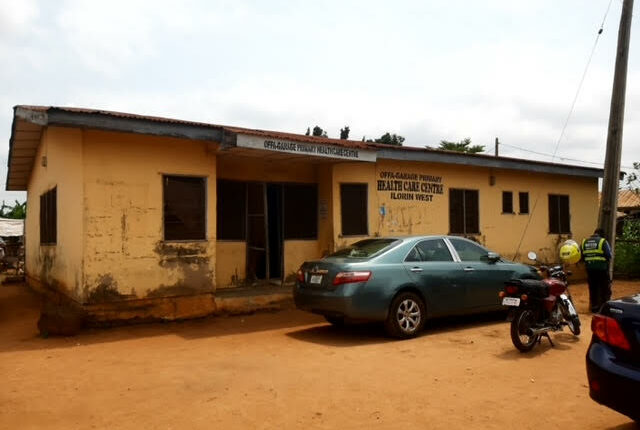

Comments are closed.